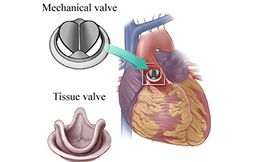
In heart valve surgery, the surgeon repairs or replaces the affected heart valves. There are many surgical procedures that may be used to repair or replace heart valves, including open-heart surgery or minimally invasive heart surgery.
In heart valve surgery, the surgeon repairs or replaces the affected heart valves. There are many surgical procedures that may be used to repair or replace heart valves, including open-heart surgery or minimally invasive heart surgery. Your treatment depends on several factors that include your health, age, the condition of the heart valve that is affected, and the severity of your condition. Heart valve replacement is a surgery done to repair or replace heart valves that aren’t functioning correctly. Due to the abnormal functioning of the heart valves, there can be a blood flow blockage in the body, which may prove fatal to the patient.
There are two main types of heart valve:
Artificial heart valve– Natural heart valves stimulate unidirectional blood flow through the valve structure from one chamber of the heart to another, so it becomes dysfunctional for a variety of pathological causes, because of which one may require complete surgical replacement of the natural heart valve with an artificial valve. An artificial heart valve is a device implanted in the heart of a patient with neurological pathways heart disease. When one of the four heart valves doesn’t function properly, the medical choice may be to replace the natural valve with an artificial valve that requires open-heart surgery.
Mechanical Valve- The main advantage of placing a mechanical valve is their durability as they usually last for the rest of the person’s life. That is why they have been historically favored in cases if younger people with an expected life span of several more decades. These types of valves are made of strong durable materials and are the most long-lasting type of replacement valve, and most of these manufactured valves will last throughout the remainder of the patients’ lifetime. However, blood clots can occur in the valve flaps or hinges and result in the malfunctioning of the valve. Which can be an imminently life-threatening situation. Additionally, if these clots break off and travel through the bloodstream or if the clot blocks an artery to the brain, it causes a stroke.
It is strongly recommended that if patients face any heart problems they should consult a cardiac doctor at the earliest in order to diagnose the exact heart disease. Some of the common symptoms of heart valve failures include:
In some cases, if patients have undergone this surgery before as well might face valve functioning problems due to blood clots, bleeding, infection, or other health issues. In such cases, the doctor might have to re-operate.
The surgery for heart valve repair is usually performed under general anesthesia by an experienced cardiac surgeon. The following are the steps of the surgery:
• First, the surgeon will make a cut (incision) in the chest dividing the breastbone (sternum) into two halves and exposing the heart. In some of the case, Surgeons may perform minimally invasive heart surgery, which involves the use of smaller incisions than those used in open-heart surgery.
• Next, the surgeon inserts the tube in the patient’s heart in order to circulate blood using a cardiopulmonary bypass machine
• Once the blood is diverted into the machine, then the heart is injected with a cold solution and then the valve is replaced. If there is a need to repair the valve, the surgeon will either trim, reshape or rebuild the valve, depending on the problem. In some cases, the surgeon might also perform a Ring Annuloplasty wherein the ring-like part of the valve is repaired. Once the valve replacement or repair is finished, the surgeon restarts the heart using electric shock paddles.
Usually, the patient spends a day or more in the intensive care unit (ICU) after the surgery. Then the patient is given fluids, nutrition, and medications through intravenous (IV) lines. Few other tubes will drain urine from the bladder and drain fluid and blood from the heart and chest. Once the heart is stable, the patient is then moved to the room and doctors and nurses constantly review the progress. The overall recovery period of the patient largely depends on his/her health before the operation and age. As a heart surgery takes ample time to heal the patient is required to take care of the instructions given by the surgeon. It takes about a few months for the patient to get back to their normal routine but they are advised to be extremely careful about infections and overstressing to ensure no relapse in the surgical procedure.
Cardiac surgery is not an easy surgery it is considered to be one of the most difficult and sensitive operations in our body and thus, they often come with certain risks and complications. You will be explained about the risk associated with the surgery beforehand to help you make the right call. Some of the common complications include:
If you have gone through a heart valve surgery, it is recommended to be extremely careful after the surgery and it’s important to take necessary precautions in order to prevent infections after a heart valve surgery. Speak to your doctor as you might need antibiotics before a dental surgery or any other invasive procedures done after this open-heart surgery.
Copyright © 2025 IMA | All Rights Reserved.